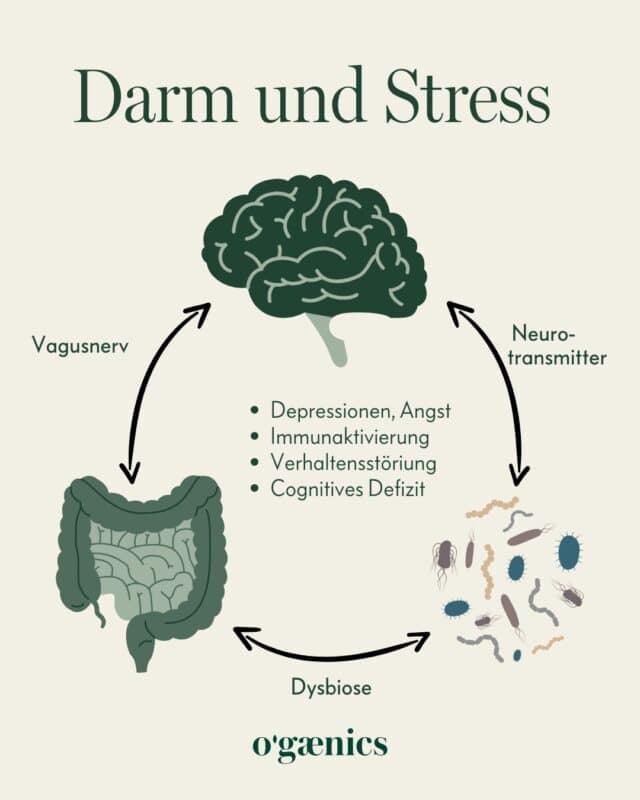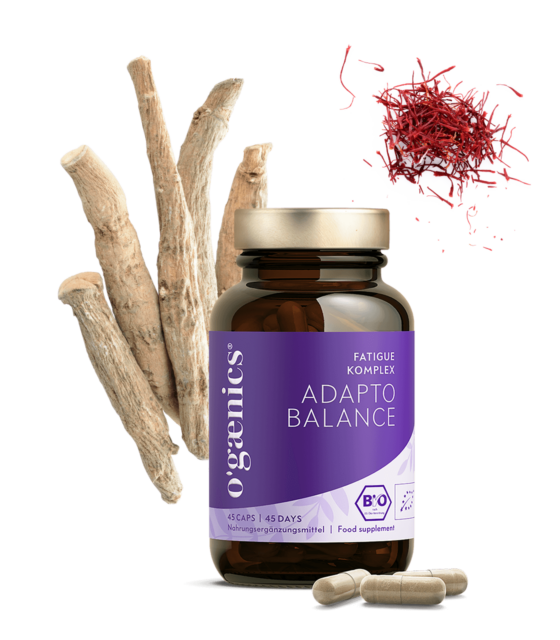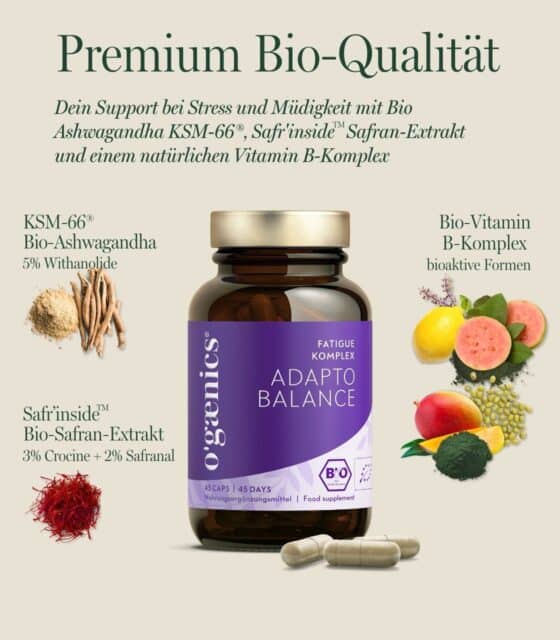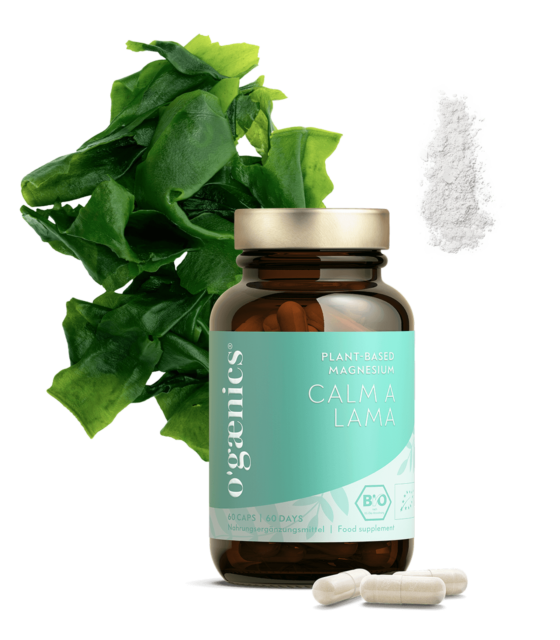Dein Darm und deine Psyche sind eng miteinander verbunden.
Kennst du das? Du hetzt von Termin zu Termin, versuchst allem gerecht zu werden – und plötzlich zwickt der Bauch. Ein Völlegefühl, das nicht vom Essen kommt. Oder dieses diffuse Grummeln, das dich abends nicht zur Ruhe kommen lässt. Manchmal reagiert unser Körper, bevor wir es selbst merken: Der Darm ist ein echtes Sensibelchen, wenn es um Stress geht.
Was viele nicht wissen: Unser Verdauungssystem ist eng mit dem Nervensystem verbunden. Es spürt genau, wenn wir unter Strom stehen – und reagiert entsprechend. Die Folge? Blähbauch, Reizdarmsymptome, Durchfall oder Verstopfung. Doch es gibt gute Nachrichten: Du kannst aktiv etwas dagegen tun.
In diesem Artikel erfährst du, was Stress im Darm tatsächlich bewirkt – und wie du mit einfachen Strategien, bewusster Ernährung und sanfter Unterstützung wieder in Balance kommst. Egal, ob du mitten im Mama-Alltag steckst, mit sensibler Verdauung kämpfst oder einfach mehr Ruhe in deinen Körper bringen möchtest: Hier findest du Antworten. Und Inspiration für einen Bauch, der sich wieder wohlfühlt.
Kopf trifft Bauch: Wie Stress deine Verdauung beeinflusst
Dass uns etwas „auf den Magen schlägt“, ist mehr als nur eine Redensart. Es gibt eine direkte Verbindung zwischen Gehirn und Darm – die sogenannte Darm-Hirn-Achse. Sie sorgt dafür, dass emotionale Belastungen nicht nur deinen Kopf beschäftigen, sondern buchstäblich bis in den Bauch wirken. Und das schneller, als dir lieb ist.
Wenn du gestresst bist – egal ob durch Zeitdruck, Konflikte oder zu viele Tabs im Kopf – wird der sogenannten Sympathikus aktiviert: der Teil des Nervensystems, der für Kampf oder Flucht zuständig ist. Dabei wird blitzschnell Energie in die Muskeln gepumpt, das Herz schlägt schneller, und: die Verdauung wird heruntergefahren. Schließlich hat sie in einer Stresssituation evolutionär gesehen gerade keine Priorität.
Bleibt dieser Zustand über längere Zeit bestehen, spürst du das deutlich:
– Du hast nach dem Essen häufiger Völlegefühl oder Blähungen.
– Deine Verdauung wird unregelmäßig, du hast öfter Durchfall oder Verstopfung.
– Du fühlst dich müde, obwohl du gegessen hast – oder permanent aufgebläht, obwohl du nichts Ungewöhnliches zu dir genommen hast.
Gerade sensible Menschen spüren diese Zusammenhänge besonders stark. Und viele Frauen – vielleicht auch du – nehmen ihre Verdauung wie ein emotionales Frühwarnsystem wahr: Wenn der Alltag zu viel wird, ist es oft der Bauch, der zuerst „nein“ sagt.
Aber: Genau hier liegt auch eine Chance. Denn wenn du lernst, die Signale deines Darms ernst zu nehmen, kannst du früh gegensteuern – und dich selbst wieder in ein gutes Gleichgewicht bringen.
Wusstest du, dass dein Körper auch nach einem festen inneren Zeitplan funktioniert? Die traditionelle chinesische Organuhr zeigt dir, wann deine Organe besonders aktiv sind – und wie du diese natürlichen Rhythmen für deine Verdauung und dein Wohlbefinden nutzen kannst.
Warum dein Mikrobiom unter Stress leidet
In deinem Darm leben Billionen von Mikroorganismen – gemeinsam bilden sie das sogenannte Mikrobiom. Es ist wie ein empfindliches Ökosystem, das nicht nur deine Verdauung, sondern auch dein Immunsystem, deine Stimmung und sogar dein Energielevel beeinflusst. Und leider: Stress bringt dieses feine Gleichgewicht schneller aus dem Takt, als du vielleicht denkst.
Wenn du im Dauerstressmodus bist, produziert der Körper vermehrt Stresshormone wie Cortisol. Diese verändern die Durchlässigkeit der Darmwand, stören die Kommunikation im Immunsystem – und wirken sich negativ auf die Zusammensetzung deiner Darmflora aus. Nützliche Bakterien werden weniger, während stressresistente – oft unerwünschte – Keime leichteres Spiel haben. Die Folge?
– Deine Verdauung wird empfindlicher,
– dein Bauch reagiert stärker auf bestimmte Lebensmittel,
– und du fühlst dich insgesamt weniger widerstandsfähig.
Gerade wer bereits zu Food Sensitivities neigt oder FODMAPs nicht gut verträgt, spürt das schnell: Plötzlich bläht der Apfel, Brot liegt schwer im Magen oder selbst der geliebte Cappuccino führt zu Bauchgrummeln. Es entsteht ein Kreislauf, der sich mit reiner Ernährung oft nur schwer durchbrechen lässt.

Die Grafik zeigt den Zusammenhang zwischen Darm, Hirn und Mikrobiom bei Stress. Die Pfeile zeigen, wie diese Systeme miteinander kommunizieren – in beide Richtungen.
Der Kreislauf:
-
Gehirn → Darm über den Vagusnerv
Wenn du gestresst bist, sendet dein Gehirn Signale über den Vagusnerv an den Darm.
➝ Das kann die Verdauung stören. -
Darm → Mikrobiom: Dysbiose
Der Stress beeinflusst die Bakterienzusammensetzung im Darm → Es entsteht eine Dysbiose (Ungleichgewicht im Mikrobiom). -
Mikrobiom → Gehirn über Neurotransmitter Das gestörte Mikrobiom wirkt über Neurotransmitter (z. B. Serotonin) zurück auf das Gehirn – und kann psychische Symptome verursachen.
Die möglichen Folgen:
- Depressionen, Angst
- Immunaktivierung → Der Körper reagiert mit Entzündungen.
- Verhaltensstörung → z. B. Reizbarkeit oder Stimmungsschwankungen
- Kognitives Defizit → Konzentrationsprobleme, Brain Fog
Stress beeinflusst also dein Mikrobiom.
Und umgekehrt beeinflusst dein Mikrobiom, wie gut du mit Stress klarkommst.
Deshalb kann es hilfreich sein, das Mikrobiom gezielt zu unterstützen – sanft, aber wirksam. Zum Beispiel mit wissenschaftlich gut untersuchten Probiotika, die dabei helfen, gesunde Darmbakterien zu fördern und das innere Gleichgewicht wiederherzustellen. Love Your Gut Daily Biotic Komplex enthält dafür wissenschaftlich erforschte Bakterienstämme, die sich besonders gut im Darm ansiedeln.
Natürlich ersetzt das keine stressfreie Lebensweise. Aber es ist ein erster Schritt, um deinem Körper zu zeigen: Ich höre dir zu. Und ich kümmere mich um dich. Ein ausgewogenes Mikrobiom ist entscheidend für deine Darmgesundheit. Erfahre mehr über die Rolle des Mikrobioms und wie du es stärken kannst
Die häufigsten Stressoren im Alltag – und wie du sie erkennst
Stress hat viele Gesichter. Er ist nicht immer laut und dramatisch – oft ist er leise, schleichend und versteckt sich im ganz normalen Alltag. Gerade Frauen spüren diesen sogenannten „Low-Level-Stress“ oft über Wochen hinweg, ohne ihn bewusst wahrzunehmen – bis unser System irgendwann auf die Bremse tritt. Und meistens ist es der Darm, der zuerst Alarm schlägt.
Hier sind typische Stressquellen, die deinen Bauch belasten können – vielleicht erkennst du dich in der einen oder anderen Situation wieder:
Multitasking im Dauermodus: Job, Familie, Partnerschaft, Haushalt, To-dos – und zwischendurch mal schnell etwas essen. Klingt bekannt? Diese ständige Überforderung lässt deinem Nervensystem kaum Pausen.
Emotionale Belastung: Sorgen, Konflikte, mentale Überlastung – auch wenn du funktionierst, arbeitet dein System innerlich auf Hochtouren.
Zu wenig Schlaf: Wir regenerieren nachts – auch der Darm. Wenn das nicht passiert, reagiert er tagsüber gereizt.
Ungeduld mit dir selbst: Hoher Anspruch, wenig Pausen, alles perfekt machen wollen – das stresst nicht nur die Seele, sondern auch dein Verdauungssystem.
Keine Zeit für regelmäßige Mahlzeiten: Wer im Gehen isst oder ständig snackt, bringt die Verdauung aus dem Rhythmus – und signalisiert „Alarm“, statt „Entspannung“.
🔎 Bin ich gestresst – und mein Darm auch?
Ein kleiner Selbst-Check kann dir helfen, sensibler für die Signale deines Körpers zu werden:
- Habe ich oft Blähungen, Völlegefühl oder unregelmäßigen Stuhlgang – ohne erkennbaren Grund?
- Reagiere ich plötzlich auf Lebensmittel, die ich früher gut vertragen habe?
- Bin ich häufig müde oder erschöpft, obwohl ich genug geschlafen habe?
- Habe ich das Gefühl, dass mein Bauch „angespannt“ ist oder sich fest anfühlt?
- Fällt es mir schwer, zur Ruhe zu kommen – selbst in stillen Momenten?
Wenn du hier innerlich oft genickt hast, lohnt sich ein genauerer Blick auf deine täglichen Stressquellen. Der erste Schritt? Bewusstsein. Der zweite? Kleine Veränderungen, die Großes bewirken können.
5 Wege, wie du deinen Darm wieder in Balance bringst
Wenn dein Darm auf Stress reagiert, bedeutet das nicht, dass du dein Leben komplett umkrempeln musst. Schon kleine, bewusste Veränderungen können viel bewirken – besonders dann, wenn sie regelmäßig stattfinden. Hier sind fünf ganzheitliche Strategien, die einfach umzusetzen sind und deinem Bauch zeigen: Du bist sicher, du darfst loslassen.
1. Atempausen statt Hochleistung: Dein Nervensystem regulieren
Ein paar tiefe Atemzüge können Wunder wirken – und dein Nervensystem von „Alarm“ auf „Entspannung“ umschalten. Besonders wirksam ist die 4-7-8-Atemtechnik: vier Sekunden einatmen, sieben Sekunden halten, acht Sekunden ausatmen. Sie signalisiert dem Körper sofort: Alles ist gut.
2. Sanfte Ernährung – auch bei wenig Zeit
Stress lässt uns oft zu Süßem, Kaffee oder schnellen Snacks greifen. Für deinen Darm ist das wie zusätzliches Feuer im Bauch. Versuche, regelmäßig leicht verdauliche, FODMAP-arme Mahlzeiten einzuplanen: gedünstetes Gemüse, Hirse, Bananenbrei mit Mandelmus, Kräutertee.
3. Bewegung als Bauchbalsam
Du musst keinen Marathon laufen – aber täglich 20 Minuten sanfte Bewegung wie Spaziergänge, Yoga oder leichtes Stretching können deine Verdauung spürbar beruhigen. Tipp: Ein kurzes Darm-Yoga am Morgen unterstützt den natürlichen Rhythmus des Darms.
4. Pflanzliche Unterstützung: Helfer aus der Natur
Pflanzenstoffe können helfen, besser mit Stress umzugehen – ohne ihn zu betäuben.
Calm A Lama, mit natürlichem Magnesium aus Bio-Grünalgen, entspannt deine Muskeln, u.a. deinen Darmmuskel (!), sondern unterstützt auch dein Nervensystem – ganz ohne Schwere. Magnesium spielt eine wichtige Rolle bei der Stressbewältigung. Entdecke hier, warum dieses Mineral so wertvoll für dein Wohlbefinden ist
Adapto Balance mit Safran ist ideal bei hormonell bedingtem Stimmungstief – etwa während des Zyklus oder in der Perimenopause.
→ Beide Optionen fügen sich unauffällig in deinen Alltag – wie ein kleines Ritual für dich selbst.
Probiotika können eine wertvolle Unterstützung für deinen Darm sein. Lies hier, was dich erwartet, wenn du Probiotika einnimmst.
5. Mini-Routinen für mehr Selbstfürsorge
Es muss nicht gleich ein Spa-Wochenende sein. Manchmal reicht es, fünf Minuten früher aufzustehen, ein warmes Getränk bewusst zu trinken oder am Abend das Handy früher wegzulegen. Rituale helfen deinem Körper, in Sicherheit zu kommen – und deinem Bauch, sich zu entspannen.
Welche Rolle Nährstoffe bei der Stressresilienz spielen
Stress verbraucht Nährstoffe – und zwar schneller, als wir denken. Gerade in intensiven Phasen greift der Körper vermehrt auf bestimmte Vitamine, Mineralstoffe und Fettsäuren zurück, um Hormone zu regulieren, das Nervensystem zu beruhigen und die Zellfunktion aufrechtzuerhalten. Wenn diese Speicher dauerhaft erschöpft sind, fehlt nicht nur Energie – auch deine emotionale Belastbarkeit sinkt. Die gute Nachricht: Mit den richtigen Mikronährstoffen kannst du gezielt gegensteuern.
Magnesium – das Ruhe-Mineral
Bei Stress wird Magnesium vermehrt über den Urin ausgeschieden. Dabei brauchst du es dringend: für entspannte Muskeln (auch im Verdauungstrakt), ein stabiles Nervensystem und besseren Schlaf. Calm A Lama liefert hochwertiges Magnesium aus Bio-Grünalgen – sanft zu deinem Bauch und gleichzeitig gut bioverfügbar.
B-Vitamine – Energie für Körper und Nerven
Vitamin B6, B12 und Folat spielen eine Schlüsselrolle bei der Bildung von Neurotransmittern wie Serotonin. Sie unterstützen deine Stressresistenz und helfen, emotionale Tiefs zu stabilisieren. In B-Happy, Adapto Balance und allen Bio-Multivitaminen von Ogaenics sind diese Vitamine optimal kombiniert – pflanzlich, bio-zertifiziert und genau in der Menge, die du in angespannten Zeiten brauchst.
Omega-3-Fettsäuren – Schutz für deine Darmbarriere
Chronischer Stress kann die Darmschleimhaut schwächen und zu sogenanntem „Leaky Gut“ führen – einer erhöhten Durchlässigkeit der Darmwand. Omega-3-Fettsäuren wirken entzündungsmodulierend und unterstützen die Regeneration der Schleimhaut. Oilalala Skin Omega Komplex enthält Omage 3-6-7-9 aus Bio-Sanddorn-Extrakt– eine besonders reine und nachhaltige Quelle, die nicht fischig schmeckt und dabei den Darm und die Hautbarriere gleichzeitig pflegt.
Adaptogene – natürliche Balancefinder
Pflanzen wie Ashwagandha und Safran gehören zu den sogenannten Adaptogenen – das bedeutet, sie helfen dem Körper, sich besser an Stress anzupassen, ohne zu sedieren. Sie wirken regulierend, ausgleichend und stärken die innere Widerstandskraft. Eine schöne Option für alle, die sich nach emotionaler Stabilität und mehr innerer Ruhe sehnen, z.B. in Ashwa Deluxe
Diese Nährstoffe sind keine Wundermittel – aber sie können wie kleine Helfer im Hintergrund wirken. Besonders dann, wenn du sie regelmäßig nutzt, achtsam mit dir umgehst und erkennst: Selbstfürsorge beginnt im Inneren.
Fazit: Du kannst mehr bewirken, als du denkst
Dein Darm ist ein feines, sensibles System – und oft der Erste, der dir zeigt, wenn etwas aus dem Gleichgewicht gerät. Gerade in stressigen Zeiten sendet er klare Signale. Nicht, um dich zu ärgern. Sondern, um dich daran zu erinnern, dass du innehalten darfst. Dass es okay ist, nicht immer nur zu funktionieren. Und dass echte Stärke oft in kleinen, liebevollen Schritten steckt.
Du musst nicht alles auf einmal verändern. Schon ein paar bewusste Atemzüge, regelmäßige Mahlzeiten, kleine Bewegungsrituale oder die Unterstützung mit natürlichen Nährstoffen können spürbar helfen. Dein Körper will mit dir – nicht gegen dich. Du musst ihm nur die Chance geben, sich zu regenerieren.
Ob du nun mitten im Berufsleben stehst, Kinder jonglierst oder deine Verdauung nach langer Zeit endlich verstehen willst: Du bist nicht allein. Und du kannst lernen, deinem Bauch wieder zu vertrauen.
Denn manchmal beginnt echte Selbstfürsorge genau hier – mit einem ruhigen Atemzug. Und der Entscheidung, dir selbst gut zu tun.
-
Bestseller
Adapto Balance
Adapto Balance Fatigue Komplex bei Stress mit Premium KSM-66® Ashwagandha, Safr'inside™ Safran-Extrakt und B-Vitaminen49,90 €1,80 € / 0.036 kg
-
Bestseller
Calm A Lama
Plant-Based Bio-Magnesium aus Premium Bio-Grünalgen-Extrakt für Muskeln und Nerven44,90 €1.076,74 € / kg
-
Bestseller
Love Your Gut
Bio Daily Biotic Komplex Premium für den Darm: 21 Bakterienstämme plus Bio-Ballaststoffeab 39,90 €2.660,00 € / kg










 Es befinden sich keine Produkte im Warenkorb.
Es befinden sich keine Produkte im Warenkorb.